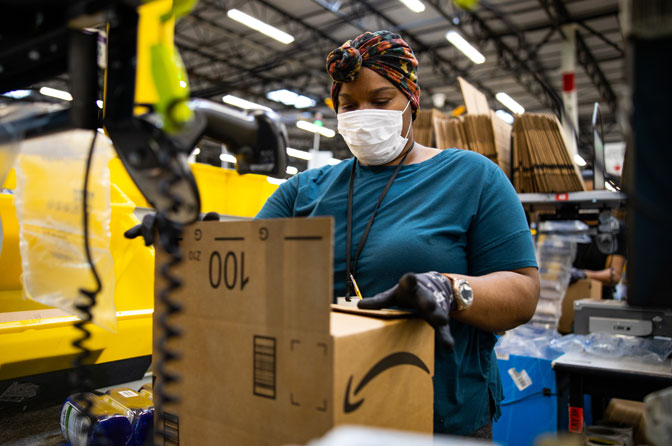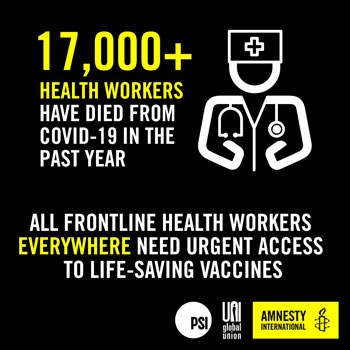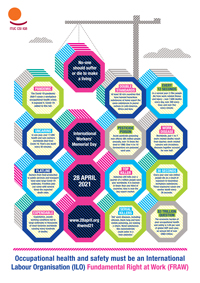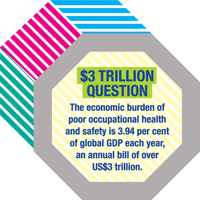
The International Organisation of Employers (IOE), the voice of the business lobby worldwide, was clear. Health and safety is of upmost importance to employers, it told the 23 March 2021 meeting of the Governing Body of the International Labour Organisation (ILO).
GETTING CLOSER On 23 March 2021 the ILO’s Governing Body – an influential committee comprised of government, employer and union delegates – overwhelmingly supported a call from worker members to move ahead with the process to designate occupational health and safety an ILO Fundamental Right at Work (FRAW). It is anticipated the decision will be formalised at the ILO Conference in 2022. more
Not getting it right had a major impact on protectivity, IOE said. But it did not believe it should be recognised as a top level ILO Fundamental Right at Work (FRAW), alongside freedom of association, the right to collective bargaining, and conventions on protection against child labour and forced labour.
Before the meeting it was unclear whether unions had the support to move the FRAW designation forward. IOE argued it was a bad fit, that irresponsible workers were frequently the problem and there were other approaches that could be pursued.
But the International Trade Union Confederation (ITUC), which speaks for unions at the ILO, had done its homework. A long list of major employers already supported recognition, including Asos, Craghoppers, Hunter, John Lewis Partnership, Next, Primark, Princes Group, New Look, Oliver Bonas, Regatta and supermarket chains Aldi, Coop, Morrisons, Sainsbury’s and Tesco.
ITUC briefings highlighted the human cost – from a workplace death every 12 seconds around the world to an economic cost of over US$3 trillion every year. Covid had amplified an existing occupational health crisis, with over 17,000 health care workers among the victims already, ITUC noted.
Pesticide poisonings were now 15 times higher than in 1990, with over 1-in-4 farmworkers poisoned each year. Asbestos was still killing a quarter of a million people annually, while ‘old’ occupational diseases like silicosis and black lung were making a comeback and new occupational threats like SARS, swine flu and Covid-19 continued to emerge. Hazardous substances at work were causing one death every 30 seconds, or over one million deaths a year.

ITUC had some powerful allies, including many influential occupational medicine and safety organisations, four of which issued statements strongly supportive of the move.
Professor Philip Landrigan, the president of the Collegium Ramazzini, which includes the world’s top occupational medicine experts in its membership, commented: “Hundreds of millions of people worldwide are harmed each year by their work. Millions more die. This carnage is preventable, but only if the protection of workers from harm is given high priority and worker health and safety is recognised as a fundamental human right.
“ILO must act at the earliest opportunity to recognise occupational health and safety as an ILO Fundamental Right at Work.”
The Institution of Occupational Safety and Health (IOSH), the largest organisation of safety professionals in the world, said in a statement ahead of the meeting it “strongly recommends that the International Labour Organisation (ILO) recognises occupational health and safety as a Fundamental Right at Work (FRAW). It added: “This universal right should be a key contributing factor of the new ‘social licence’ to operate and govern in today’s more socially aware world of work.
“We would welcome action by the ILO Governing Body at the earliest available opportunity.”
Also on board was the UK-based Society of Occupational Medicine, which noted it “strongly supports designation of occupational health and safety as an International Labour Organisation (ILO) Fundamental Right at Work (FRAW).” It added the ILO Governing Body should “act expeditiously” to progress the issue.
The International Commission on Occupational Health (ICOH) also issued a supportive statement, noting new data indicated there has been a sharp rise in work-related disease deaths worldwide. “ICOH urges the ILO Governing Body to take action to progress the decision of the ILO Centenary Conference of 2019, to have a confirmation that safety and health is recognised as a Fundamental Right at Work,” the statement noted.
Governments on the ILO Governing Body – the organisation that set the ILO’s agenda – listened to arguments from IOE and ITUC. Governments in every region of the globe supported the ITUC-originated call – just one single government representative spoke against – with a proposal now going for a final decision at the International Labour Conference in 2022.
ITUC said recognising occupational health and safety as an ILO fundamental right will increase the accountability of governments and employers in saving lives at work and to get more countries to ratify vital ILO health and safety conventions.
This would fulfil a pledge in the 2019 ILO Centenary Declaration, unanimously adopted by governments, workers and employers, to ensure occupational health and safety for all workers. It would raise the status of occupational health and safety and would mean ILO’s 178 member states would have to abide by its occupational health and safety rules, whether or not they had ratified the related conventions.

SAME PACKAGE Amazon fulfilment centres the world over suffered Covid outbreaks and workers were fired for raising safety concerns. But this wasn’t a Covid-specific problem. Workers had faced the same fate for ‘normal’ workplace health problems. And Amazon is far from unique. more
It would encourage more countries to ratify and implement these key ILO health and safety conventions, especially Convention 155 on establishing national systems – with the involvement of employers and unions - to prevent injuries and illnesses arising from work. And it would lead to health and safety requirements being incorporated in trade agreements and throughout global supply chains.
Welcoming the ILO Governing Body decision, ITUC general secretary Sharan Burrow commented: “Governments have recognised the case unions have made all around the world, which is that we need to get this done as soon as possible. “Workers’ lives are at stake, and we need occupational health and safety to be a Fundamental Right at Work at the ILO so we can save lives at work.”
But while the 23 March 2021 roadmap brought recognition much closer, it is not yet a done deal, so ITUC’s campaign is set to continue. “Employers need to recognise that their licence to operate depends on protecting workers and preventing work-related injuries and ill-health,” Burrow said. “We need to put people before profit, and the ILO Governing Body’s decision now needs to be implemented urgently, with a final decision no later than 2022.”
The next step in the campaign is International Workers’ Memorial Day on 28 April 2021, when ITUC says “unions can send a message that health and safety protection at work must be recognised as a right for all. Whether it is Covid or occupational cancers, or workplace injuries and industrial diseases, every worker should have a right to a voice and a right to protection. No-one should have to die to make a living.”
According to ITUC general secretary Sharan Burrow: “We will keep up the pressure, on International Workers’ Memorial Day and beyond.”
Information
Multinational challenge
DEAD MEAT A California meatpacking plant owned by the multinational Smithfield company and where hundreds of workers developed Covid-19 was fined in November 2020 for putting its employees and temporary staff at risk. US foodworkers’ union UFCW reported that by then that more than 315 workers out of 1,800 at the Farmer John plant in Vernon have contracted the coronavirus.
PROBLEMS DISMISSED Workers at a factory in Ciudad Juárez, Mexico, owned by the Swedish multinational Electrolux were fired after raising Covid-19 safety concerns. Global union IndustriALL reports the workers had tried to start a dialogue when management insisted on keeping operations running despite an emergency decree allowing only essential work, a number of Covid infections among staff and a lack of personal protection equipment
BANANAS In Ecuador, abaca workers employed by the Japanese-owned Ecuadorian company Furukawa are forced to endure deplorable living conditions and are typically not provided with protective gloves, masks or clothing for dangerous activities that have resulted in serious injuries and amputations, Equal Times reported in February 2021.
SAFETY COLLAPSE The deaths of three ArcelorMittal workers on 16 February 2021, killed when part of a building collapses at its plant in Vanderbijlpark, South Africa, came after earlier union safety warnings. NUMSA, an affiliate of the global union IndustriALL, said the multinational has been “brutal” in the way it dealt with health and safety concerns raised by the union, resulting in the dismissal of a shop steward who exposed poor health and safety protocols at the company prior to tragedy.
GIG WORKERS A succession of Deliveroo rider deaths across the world in recent months has highlighted a failure by gig economy platforms to take responsibility for the health and safety of their workers. If February 2021, global union ITF said Deliveroo workers are treated as though they are ‘disposable’, calling for them to be given the opportunity to elect health and safety representatives in all of the 12 countries where the company operates.
‘Fundamental’ health and safety moves a step closer
The ILO Governing Body decision was a ‘significant step’ towards making occupational health and safety a fundamental workers’ right, ITUC said. On 23 March 2021 the influential committee comprised of government, employer and union delegates overwhelmingly supported a call from worker members to move ahead with the process. It is expected that the decision will be formalised at the ILO Conference in 2022.
Sharan Burrow, ITUC general secretary, said: “We would like to have seen this year’s ILO conference add health and safety to the list of fundamental rights, but we appreciate the support of governments for it to happen next year. This will mean greater accountability for governments and business for saving lives at work.” She added: “It is all the more important given the terrible toll of the Covid-19 pandemic. Safe workplaces mean greater safety for workers and for the public as well. Clear evidence is emerging around the world that most Covid outbreaks are occurring in workplaces, including schools.”
The union-driven move was supported by occupational medicine organisations the Collegium Ramazzini and the Society of Occupational Medicine and leading workplace safety bodies the Institution of Occupational Safety and Health (IOSH) and the International Commission on Occupational Health (ICOH). Unions had success at the ILO Governing Body meeting with another health and safety priority, striking an agreement that a Biological Hazards Convention will follow after occupational health and safety in ILO’s ruling making priorities.
28 APRIL 2021
It didn’t happen overnight. But after a stunning campaign led by the International Trade Union Confederation (ITUC), occupational health and safety is on track to be elevated in 2022 to be one of the International Labour Organisation’s ‘Fundamental Rights at Work.’
| Factfile | |
| • | Read the ITUC/Hazards 28 April fundamental factfile |
| Poster |
 |
| Contents | |
| • | Introduction |
| • | Information |
| • | Multinational challenge |
| • | ‘Fundamental’ health and safety moves a step closer |
| Hazards webpages | |
| • | Hazards news |
| • | 28 April |




